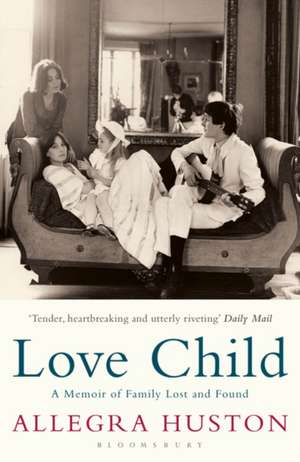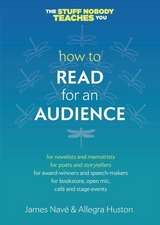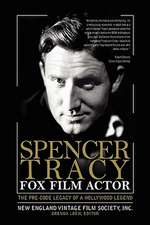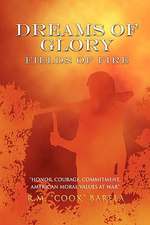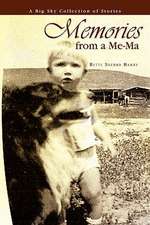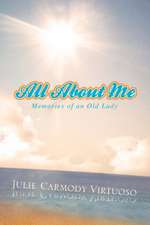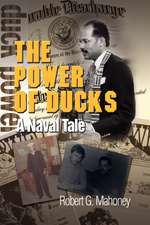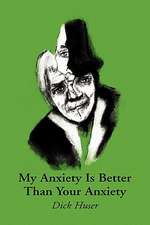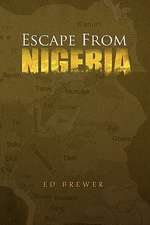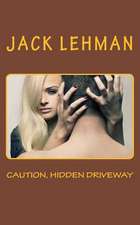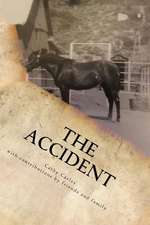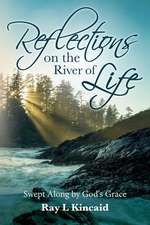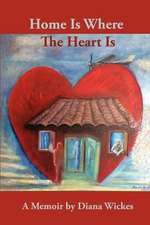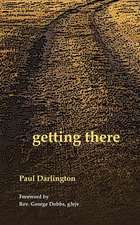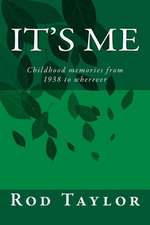Love Child: A Memoir of Family Lost and Found
Autor Allegra Hustonen Limba Engleză Paperback – 28 feb 2010
| Toate formatele și edițiile | Preț | Express |
|---|---|---|
| Paperback (2) | 44.45 lei 3-5 săpt. | |
| Bloomsbury Publishing – 28 feb 2010 | 44.45 lei 3-5 săpt. | |
| Simon&Schuster – 19 apr 2010 | 114.54 lei 3-5 săpt. |
Preț: 44.45 lei
Preț vechi: 57.67 lei
-23% Nou
Puncte Express: 67
Preț estimativ în valută:
8.51€ • 8.90$ • 7.04£
8.51€ • 8.90$ • 7.04£
Carte disponibilă
Livrare economică 15-29 martie
Preluare comenzi: 021 569.72.76
Specificații
ISBN-13: 9781408803066
ISBN-10: 1408803062
Pagini: 304
Ilustrații: Illustrations, ports.
Dimensiuni: 129 x 198 x 20 mm
Greutate: 0.24 kg
Editura: Bloomsbury Publishing
Colecția Bloomsbury Paperbacks
Locul publicării:London, United Kingdom
ISBN-10: 1408803062
Pagini: 304
Ilustrații: Illustrations, ports.
Dimensiuni: 129 x 198 x 20 mm
Greutate: 0.24 kg
Editura: Bloomsbury Publishing
Colecția Bloomsbury Paperbacks
Locul publicării:London, United Kingdom
Caracteristici
For fans of Cold Cream by Ferdinand Mount, Bad Blood by Lorna Sage and When Did You Last See Your Father? by Blake Morrison
Notă biografică
ALLEGRA HUSTON was born in London and raised in Ireland, Long Island and Los Angeles. She worked in publishing for Chatto & Windus and Weidenfeld & Nicolson, where she was editorial director, and then as a writer, her work appearing in various publications, including The Times, the Independent, Tatler, and Harper's Bazaar as well as French Vogue. She now lives in Taos, New Mexico.
Recenzii
'This extraordinary book reveals the all but unendurable sorrow of loss, and the difficulties of those unwilling to live in a world without love. Because Huston's concerns are with what she has seen and learned, rather than with alienation and the affixing of blame, her memoir glimmers with triumphant wisdom'
'A fascinating and profoundly moving exploration of family secrets. Poignant, inspiring and beautifully written, an intriguing first-hand account of growing up inside a world the rest of us can only read about'
'A touching glimpse of the pain and longing felt by a child who doesn't quite belong to anyone, this unsentimental journey through the star-studded vacuum of her various families is unexpectedly tender and forgiving. She writes with an artist's eye for detail, with the clear gaze of a small outsider, searching forever for love'
'A fascinating and profoundly moving exploration of family secrets. Poignant, inspiring and beautifully written, an intriguing first-hand account of growing up inside a world the rest of us can only read about'
'A touching glimpse of the pain and longing felt by a child who doesn't quite belong to anyone, this unsentimental journey through the star-studded vacuum of her various families is unexpectedly tender and forgiving. She writes with an artist's eye for detail, with the clear gaze of a small outsider, searching forever for love'
Descriere
A moving and enchanting memoir told from within one of America's great Hollywood dynasties by the daughter of two famous men - John Huston and John Julius Norwich
Extras
1
I am playing on the parquet floor of the drawing room. The wood is golden, with dark lines that swirl like puddles when you jump in them. The wax gleams dull. It must be a cloudy day.
There are grown-ups in the room, but I don't pay them much attention. The atmosphere is somber. I feel like I'm the only one who's entirely alive, so I slide my feet across the smooth floor to prove it. I'm wearing woolly tights and no shoes. I want to make some noise because the silence is getting loud, but I'm a good girl so I don't.
"I want you all to come up to Ricki's room."
I don't have to look up to know whose voice that is: precise, almost fussy, with a funny lilt. It's my godfather, Leslie Waddington. He has tight curly hair and a nose like a bird's beak. One of my favorite books is a field guide to birds.
His words clang a sour note in my ears. Why, I wonder, should everyone barge into my mother's room when she's not there? She's been away for a few days, and won't be back for days more. You don't go into people's rooms without permission. Still, I've already realized that there are many odd things in the world. I look up to see if there's anything especially odd about this one: any clues to what's going on.
Leslie doesn't look at me as he disappears out the door. Nor does anyone else. The sour note dies away: obviously whatever is going on doesn't include me. I relax. Vaguely I take notice of their backs, leaving.
"I think he means you too," says a woman's voice. It startles me. I thought they'd left me alone.
It's Leslie's wife, Ferriel, sunk in a low chair. Her blond hair hangs down as if it has invisible weights on the ends. She looks blue-gray, the same color as the walls. The light has gone out of the portion of space she's in.
Her eyes are flat. She doesn't "think." She knows he means me too.
I jump up, wanting to catch up before anyone notices that I didn't go with them. I hate being in the wrong. Also, I hate being late. I run out of the room.
This is where the memory ends. Upstairs, I will be lifted onto Mum's bed to sit between my brother, Tony, and my sister, Anjelica -- two dark heads flanking my little blond one. They're much older than me: eighteen and seventeen. I am four.
Leslie will sit on a low chair opposite us. He will tell me that my mother has been killed in a car crash while driving across France on her way to her father's house in northern Italy for a holiday. She will not come home. I will never see her again.
Anjelica and Tony already know. Leslie has taken on the task of telling me because Mum asked him to look after me if anything ever happened to her. He has choreographed this scene in her bedroom especially for me.
In the silence that followed his words, I let out a sound that my sister describes as a banshee wail. It went on much longer than the amount of breath I could possibly have held in my small lungs. It was unearthly, she says, like no sound she'd ever heard. It chilled her. I didn't cry.
I didn't cry on my first day at Stepping Stones nursery school, either. My best friend, Lionel Smith-Gordon, did, and I was mortified. I kissed my mother good-bye and edged away from Lionel, trying to pretend that I didn't know him. He was clinging to his mother, howling. We were two years old. I was very impressed by the children who were three.
I was a proper little English girl, with patent-leather shoes and a navy coat and clothes perfectly pressed by Nurse, my Irish nanny. There was a gilt A on the door of my room, for Allegra, and on the same landing a T for Tony and a K for Nurse. I thought it should have been an N, even after Nurse told me that her real name was Kathleen. I didn't see what that had to do with it. Everyone called her Nurse.
Every morning, Nurse gave me my breakfast in the pine-paneled kitchen, which opened onto the garden behind the house. One day, the mother who was supposed to pick me up and take me to school didn't come. I heard Mum's feet running down the stairs. She was still in her pajamas -- blue, my favorite color -- but she had real shoes on her feet, dark and square-toed. "I'll have to take you," she said. She grabbed a raincoat from a peg by the front door and tied the belt around her waist. I don't think it was raining.
I watched her as she drove: the bones of her hands sticking up above the steering wheel like little mountains, her eyes fixed on the road. The side of her nose and her cheek shone pale against her dark hair. She didn't look at me where I sat beside her in the passenger seat; she was concentrating on the road. We had waited too long for the mother who didn't come.
Her left hand reached over and slotted the gear stick down, across, and down again, slowing for a corner. It always amazed me that she didn't have to look. I could just see, under the sandy-colored raincoat, the pale blue edge of her pajamas where they fell into the hollow of her collarbone. I was wearing a kilt, I think: warm winter clothes, certainly. Woolly tights again. I was probably four by then, old enough to be carpooled to school. Mum died in January 1969. This can't have been long before.
I started to worry. She's driving too fast, I thought. The police will see us and stop us for speeding. They'll make her get out of the car. They'll take her to the police station. And there she'll be, with nowhere to hide and all those policemen, wearing only her pajamas and a raincoat.
I liked things to be correct. My favorite pastime was to practice writing, which I did in lined exercise books. Nurse would write out the alphabet for me, a letter to a page, in a column along the left side, and for hours I would form laborious a's, b's, and so on. If I messed up I would throw out the book and start a new one at a again. I made it as far as r -- Nurse's cursive, lowercase r's had fat loops at the top, and an angle of descent that for some reason I thought of as especially Irish. Line after line, I couldn't get mine to match hers. I was English, and obviously that had something to do with it; but I wasn't trying to write English r's, I was copying Nurse's. It drove me mad that I couldn't do it.
No one wanted perfection but me. Mum would have had more sympathy with the way my own son writes letters, adding extra crosspieces to an E or leaning an R forward and telling me it's running. She had grown up with a ballet dancer's ferocious discipline and obsession with detail. She didn't raise her children the same way.
In my room she hung a silvered glass ball, mottled dark like a planet of strange metals, and every night I fell asleep to the sound of Chopin on the record player. Her closest friends were artists. Often she took me to visit her friend Gina Medcalf, whose painting studio was a big open space with a window seat I loved to nestle in. Once we brought a Lego kit with a picture of a house on the box, whose regular windows, red-tiled roof, and solid-looking chimney were, to my eyes, perfect. I started putting it together, but it was hard, because you couldn't see the joins between same-colored blocks in the picture. Gina started playing around, seeing what other shapes she could make with the blocks we had: more fun, she urged me, than my mulish devotion to doing what the Lego people wanted us to do. I was having none of it. I'd chosen this Lego exactly because the blocks could make -- were supposed to make -- the house that was pictured on the box.
I didn't like things to be free-form; it unsettled me. I preferred paint-by-numbers and drawing by join-the-dots. I peered at the picture, figuring out how many blocks went between the window and the roof, and what it should look like on the other side. I could feel Mum's frustration. Her disappointment bled toward me, though she tried to conceal it. I knew she wished I was imaginative like Gina. I refused to feel it was my failing. I knew, as she and Gina obviously didn't, that there was a right way and a wrong way to do Lego. I was someone who did things right.
It's Mum's turn to carpool home from school. There are two of us, so we're in the back seat. Mum has stopped to buy something. She's left the car double-parked. The other cars have to edge around us.
My friend and I are bouncing as hard as we can on the springy seat while Mum is in the shop. It's the sixties; we don't have child seats. We're giggling and shouting: two little girls having the time of our lives.
Suddenly Mum's face is at the passenger-side window. She's angry. "Stop it! Right now! The brake isn't on and you'll make the car roll down the hill!"
We subside. I can feel the seat quivering. I'm embarrassed in front of my friend, having my mother tell us off. I'm silently indignant. It wasn't my fault she didn't put the brake on, and if she parked on a hill, why didn't she put it on instead of blaming us?
It intrigues me to think why some memories stayed when others were lost. In the years after Mum's death, most of my images of her faded away; but a few seared tracks in the electric labyrinth of my brain. It was pride that preserved the memory of being given a book, aged two, by a woman who said, "Of course she won't be able to read it yet," and I knowing that I could, and sitting on the top step of the stairs with Nurse and reading it as Mum showed the woman to the door. And fear that preserved others, such as the time we watched a friend of Mum's walk like a circus performer along the high rafter of a barnlike room in Kent; or the time Mum and I got out of a train on the way to Cornwall to buy something to drink, maybe, from the kiosk on the platform. As we walked back toward our compartment, the train started to move. I tugged at her, straining for the nearest door. I couldn't understand why she still walked calmly down the platform while the train was gaining speed and about to leave without us -- why she didn't at least run. When we got to our door, which was still open, I put my hand on her wrist to climb the steps. She climbed them behind me.
And memory after memory of Mum and a car.
"Your mother's new car is here, Allegra! Come and see it!"
I'm in the drawing room again, alone for some reason. Usually I'm with Nurse. I don't remember who the woman was who called me; she rushed out immediately. A friend of Mum's.
I run to the window and climb up on the square, ranked iron tubes of the radiator. I know they're cold, they won't burn me; it must have been spring or summer. Outside, the sunlight is cut into shafts by the green leaves, as big as plates, of the tall, spreading trees that line the road. Opposite, beyond a black iron railing, is a canal lined with painted houseboats. Flowers spill out of pots on their roofs.
I look from side to side for Mum, and the car. There she is, below me. The top of her head is divided in two by the part in her hair. She's wearing a billowy skirt. The car she's next to is red. I know she had the car repainted -- it's not really new -- and I'm annoyed that she chose red. I hate red. My excitement drains away like bathwater.
All my life I've returned to these memories, familiar and unquestioned, their anguish smoothed away by use. They've been solid, like way posts seen out of the corner of my eye. But now, when I look at them head-on, they turn slippery, like fish. Sometimes the whole picture slithers away into a murky doubt, and I'm not sure I even remember it at all.
The angle at which I looked down on Mum's head isn't the angle from the drawing-room window, but from my bedroom two stories above. I picture the car to the right -- then suddenly it's away to the left. A stick-shift car parked on a hill without the parking brake must be in gear -- so it can't roll down a hill. Mum must have been afraid that we'd bounce the car off the brake, but my memory insists those are the words she said.
I think all these remembered cars must be the same one, though Anjelica remembers Mum's car as dark gray, and my godmother Gina says blue or -- if it has to be red -- maroon, not the bright red I'm sure I saw. Maybe the red that wasn't really the car is the red of the cake I got for my birthday, in the shape of a train. Not only did I hate red, but red icing meant cinnamon, and I loathed cinnamon.
I was offended and furious, and I held on to my hurt even during the trip on the Water Bus along the canal to the zoo. I loved the Water Bus, but that day it felt like a bribe, and I wasn't buying. My cake had obviously been meant for someone else; I didn't even like trains. How could Mum have chosen it for me? Did she not know me at all?
I'm hungry for every scrap of the life my mother and I shared. I can see her love for me in pictures of the two of us, in the photo of me that has a big pink heart superimposed on it; in my collages and drawings that she had framed, in the scraps of paper that record my first words and my first tooth. But I don't carry it inside me. Why didn't those memories -- whatever they might have been -- survive?
The harder I flex my memory, the more the stories dissolve. It makes me sick to my stomach. I feel as if I'm somehow playing myself for a fool. How many of the few, delicate threads that bind me to my mother are fictions? In the blue-pajamas-and-a-raincoat memory I'm wearing a red tartan kilt with a big safety pin -- but a demon in my head whispers that I just added this in the remembering. I'm trawling my brain, and I can't tell from which part of it the fragments come. Maybe I did just make that kilt up, or more likely I borrowed it from some other time and place. Maybe these borrowings of memory were done a long time ago.
One memory doesn't shape-shift or dissolve. It's cold and immovable, like a stone. I don't remember it directly. I remember remembering it.
It's the evening of the day on which Leslie told me my mother was dead. It's about six-thirty. I know that because Nurse is about to come into my bedroom to start getting me ready for bed. I'm playing with my favorite toy: a map of Britain with place-names on little sticky transparent labels; or maybe it was my farmyard, with wooden animals and fences and barns. I'm utterly content as I play. Not a care in the world.
I see myself from outside, as if Nurse's sight of me has become my own from the vantage point of a year or so in the future. My bedroom then, where the memory lived with me, had a dark wood bed with blue-and-green bed curtains, not the pink-and-white candy-cane-striped iron bed I had in Mum's house. I still had those toys, though, set up in a corner: the map pinned to the wall, the farmyard arranged on the sloping, green-carpeted floor.
How could I have played? The same day.
Secretly I scalded myself with that memory. How unfeeling I was, how self-centered. How just plain stupid, not to have understood. How unworthy of love, not to have cried for the entire day when I knew that my mother was dead. I deserved to lose her.
Already, a year later, I had no memory of actually being told. I blamed myself even more: that hard-hearted little girl who played didn't care enough to carry the actual loss with her. I shocked myself, and the self that was shocked had no sympathy for the self that obliterated the truth in the only way it could.
Very soon, I lost all memories of the aftermath: the return to school and the looks I must have got, the house being packed up, my stay with Nurse at the house of my mother's friends the O'Tooles. I erased every shadow of my own misery, of Anjelica's, of Tony's. All I remembered was the playing before, and the playing after. As if a chasm hadn't opened up in between.Copyright © 2009 by Allegra Huston
I am playing on the parquet floor of the drawing room. The wood is golden, with dark lines that swirl like puddles when you jump in them. The wax gleams dull. It must be a cloudy day.
There are grown-ups in the room, but I don't pay them much attention. The atmosphere is somber. I feel like I'm the only one who's entirely alive, so I slide my feet across the smooth floor to prove it. I'm wearing woolly tights and no shoes. I want to make some noise because the silence is getting loud, but I'm a good girl so I don't.
"I want you all to come up to Ricki's room."
I don't have to look up to know whose voice that is: precise, almost fussy, with a funny lilt. It's my godfather, Leslie Waddington. He has tight curly hair and a nose like a bird's beak. One of my favorite books is a field guide to birds.
His words clang a sour note in my ears. Why, I wonder, should everyone barge into my mother's room when she's not there? She's been away for a few days, and won't be back for days more. You don't go into people's rooms without permission. Still, I've already realized that there are many odd things in the world. I look up to see if there's anything especially odd about this one: any clues to what's going on.
Leslie doesn't look at me as he disappears out the door. Nor does anyone else. The sour note dies away: obviously whatever is going on doesn't include me. I relax. Vaguely I take notice of their backs, leaving.
"I think he means you too," says a woman's voice. It startles me. I thought they'd left me alone.
It's Leslie's wife, Ferriel, sunk in a low chair. Her blond hair hangs down as if it has invisible weights on the ends. She looks blue-gray, the same color as the walls. The light has gone out of the portion of space she's in.
Her eyes are flat. She doesn't "think." She knows he means me too.
I jump up, wanting to catch up before anyone notices that I didn't go with them. I hate being in the wrong. Also, I hate being late. I run out of the room.
This is where the memory ends. Upstairs, I will be lifted onto Mum's bed to sit between my brother, Tony, and my sister, Anjelica -- two dark heads flanking my little blond one. They're much older than me: eighteen and seventeen. I am four.
Leslie will sit on a low chair opposite us. He will tell me that my mother has been killed in a car crash while driving across France on her way to her father's house in northern Italy for a holiday. She will not come home. I will never see her again.
Anjelica and Tony already know. Leslie has taken on the task of telling me because Mum asked him to look after me if anything ever happened to her. He has choreographed this scene in her bedroom especially for me.
In the silence that followed his words, I let out a sound that my sister describes as a banshee wail. It went on much longer than the amount of breath I could possibly have held in my small lungs. It was unearthly, she says, like no sound she'd ever heard. It chilled her. I didn't cry.
I didn't cry on my first day at Stepping Stones nursery school, either. My best friend, Lionel Smith-Gordon, did, and I was mortified. I kissed my mother good-bye and edged away from Lionel, trying to pretend that I didn't know him. He was clinging to his mother, howling. We were two years old. I was very impressed by the children who were three.
I was a proper little English girl, with patent-leather shoes and a navy coat and clothes perfectly pressed by Nurse, my Irish nanny. There was a gilt A on the door of my room, for Allegra, and on the same landing a T for Tony and a K for Nurse. I thought it should have been an N, even after Nurse told me that her real name was Kathleen. I didn't see what that had to do with it. Everyone called her Nurse.
Every morning, Nurse gave me my breakfast in the pine-paneled kitchen, which opened onto the garden behind the house. One day, the mother who was supposed to pick me up and take me to school didn't come. I heard Mum's feet running down the stairs. She was still in her pajamas -- blue, my favorite color -- but she had real shoes on her feet, dark and square-toed. "I'll have to take you," she said. She grabbed a raincoat from a peg by the front door and tied the belt around her waist. I don't think it was raining.
I watched her as she drove: the bones of her hands sticking up above the steering wheel like little mountains, her eyes fixed on the road. The side of her nose and her cheek shone pale against her dark hair. She didn't look at me where I sat beside her in the passenger seat; she was concentrating on the road. We had waited too long for the mother who didn't come.
Her left hand reached over and slotted the gear stick down, across, and down again, slowing for a corner. It always amazed me that she didn't have to look. I could just see, under the sandy-colored raincoat, the pale blue edge of her pajamas where they fell into the hollow of her collarbone. I was wearing a kilt, I think: warm winter clothes, certainly. Woolly tights again. I was probably four by then, old enough to be carpooled to school. Mum died in January 1969. This can't have been long before.
I started to worry. She's driving too fast, I thought. The police will see us and stop us for speeding. They'll make her get out of the car. They'll take her to the police station. And there she'll be, with nowhere to hide and all those policemen, wearing only her pajamas and a raincoat.
I liked things to be correct. My favorite pastime was to practice writing, which I did in lined exercise books. Nurse would write out the alphabet for me, a letter to a page, in a column along the left side, and for hours I would form laborious a's, b's, and so on. If I messed up I would throw out the book and start a new one at a again. I made it as far as r -- Nurse's cursive, lowercase r's had fat loops at the top, and an angle of descent that for some reason I thought of as especially Irish. Line after line, I couldn't get mine to match hers. I was English, and obviously that had something to do with it; but I wasn't trying to write English r's, I was copying Nurse's. It drove me mad that I couldn't do it.
No one wanted perfection but me. Mum would have had more sympathy with the way my own son writes letters, adding extra crosspieces to an E or leaning an R forward and telling me it's running. She had grown up with a ballet dancer's ferocious discipline and obsession with detail. She didn't raise her children the same way.
In my room she hung a silvered glass ball, mottled dark like a planet of strange metals, and every night I fell asleep to the sound of Chopin on the record player. Her closest friends were artists. Often she took me to visit her friend Gina Medcalf, whose painting studio was a big open space with a window seat I loved to nestle in. Once we brought a Lego kit with a picture of a house on the box, whose regular windows, red-tiled roof, and solid-looking chimney were, to my eyes, perfect. I started putting it together, but it was hard, because you couldn't see the joins between same-colored blocks in the picture. Gina started playing around, seeing what other shapes she could make with the blocks we had: more fun, she urged me, than my mulish devotion to doing what the Lego people wanted us to do. I was having none of it. I'd chosen this Lego exactly because the blocks could make -- were supposed to make -- the house that was pictured on the box.
I didn't like things to be free-form; it unsettled me. I preferred paint-by-numbers and drawing by join-the-dots. I peered at the picture, figuring out how many blocks went between the window and the roof, and what it should look like on the other side. I could feel Mum's frustration. Her disappointment bled toward me, though she tried to conceal it. I knew she wished I was imaginative like Gina. I refused to feel it was my failing. I knew, as she and Gina obviously didn't, that there was a right way and a wrong way to do Lego. I was someone who did things right.
It's Mum's turn to carpool home from school. There are two of us, so we're in the back seat. Mum has stopped to buy something. She's left the car double-parked. The other cars have to edge around us.
My friend and I are bouncing as hard as we can on the springy seat while Mum is in the shop. It's the sixties; we don't have child seats. We're giggling and shouting: two little girls having the time of our lives.
Suddenly Mum's face is at the passenger-side window. She's angry. "Stop it! Right now! The brake isn't on and you'll make the car roll down the hill!"
We subside. I can feel the seat quivering. I'm embarrassed in front of my friend, having my mother tell us off. I'm silently indignant. It wasn't my fault she didn't put the brake on, and if she parked on a hill, why didn't she put it on instead of blaming us?
It intrigues me to think why some memories stayed when others were lost. In the years after Mum's death, most of my images of her faded away; but a few seared tracks in the electric labyrinth of my brain. It was pride that preserved the memory of being given a book, aged two, by a woman who said, "Of course she won't be able to read it yet," and I knowing that I could, and sitting on the top step of the stairs with Nurse and reading it as Mum showed the woman to the door. And fear that preserved others, such as the time we watched a friend of Mum's walk like a circus performer along the high rafter of a barnlike room in Kent; or the time Mum and I got out of a train on the way to Cornwall to buy something to drink, maybe, from the kiosk on the platform. As we walked back toward our compartment, the train started to move. I tugged at her, straining for the nearest door. I couldn't understand why she still walked calmly down the platform while the train was gaining speed and about to leave without us -- why she didn't at least run. When we got to our door, which was still open, I put my hand on her wrist to climb the steps. She climbed them behind me.
And memory after memory of Mum and a car.
"Your mother's new car is here, Allegra! Come and see it!"
I'm in the drawing room again, alone for some reason. Usually I'm with Nurse. I don't remember who the woman was who called me; she rushed out immediately. A friend of Mum's.
I run to the window and climb up on the square, ranked iron tubes of the radiator. I know they're cold, they won't burn me; it must have been spring or summer. Outside, the sunlight is cut into shafts by the green leaves, as big as plates, of the tall, spreading trees that line the road. Opposite, beyond a black iron railing, is a canal lined with painted houseboats. Flowers spill out of pots on their roofs.
I look from side to side for Mum, and the car. There she is, below me. The top of her head is divided in two by the part in her hair. She's wearing a billowy skirt. The car she's next to is red. I know she had the car repainted -- it's not really new -- and I'm annoyed that she chose red. I hate red. My excitement drains away like bathwater.
All my life I've returned to these memories, familiar and unquestioned, their anguish smoothed away by use. They've been solid, like way posts seen out of the corner of my eye. But now, when I look at them head-on, they turn slippery, like fish. Sometimes the whole picture slithers away into a murky doubt, and I'm not sure I even remember it at all.
The angle at which I looked down on Mum's head isn't the angle from the drawing-room window, but from my bedroom two stories above. I picture the car to the right -- then suddenly it's away to the left. A stick-shift car parked on a hill without the parking brake must be in gear -- so it can't roll down a hill. Mum must have been afraid that we'd bounce the car off the brake, but my memory insists those are the words she said.
I think all these remembered cars must be the same one, though Anjelica remembers Mum's car as dark gray, and my godmother Gina says blue or -- if it has to be red -- maroon, not the bright red I'm sure I saw. Maybe the red that wasn't really the car is the red of the cake I got for my birthday, in the shape of a train. Not only did I hate red, but red icing meant cinnamon, and I loathed cinnamon.
I was offended and furious, and I held on to my hurt even during the trip on the Water Bus along the canal to the zoo. I loved the Water Bus, but that day it felt like a bribe, and I wasn't buying. My cake had obviously been meant for someone else; I didn't even like trains. How could Mum have chosen it for me? Did she not know me at all?
I'm hungry for every scrap of the life my mother and I shared. I can see her love for me in pictures of the two of us, in the photo of me that has a big pink heart superimposed on it; in my collages and drawings that she had framed, in the scraps of paper that record my first words and my first tooth. But I don't carry it inside me. Why didn't those memories -- whatever they might have been -- survive?
The harder I flex my memory, the more the stories dissolve. It makes me sick to my stomach. I feel as if I'm somehow playing myself for a fool. How many of the few, delicate threads that bind me to my mother are fictions? In the blue-pajamas-and-a-raincoat memory I'm wearing a red tartan kilt with a big safety pin -- but a demon in my head whispers that I just added this in the remembering. I'm trawling my brain, and I can't tell from which part of it the fragments come. Maybe I did just make that kilt up, or more likely I borrowed it from some other time and place. Maybe these borrowings of memory were done a long time ago.
One memory doesn't shape-shift or dissolve. It's cold and immovable, like a stone. I don't remember it directly. I remember remembering it.
It's the evening of the day on which Leslie told me my mother was dead. It's about six-thirty. I know that because Nurse is about to come into my bedroom to start getting me ready for bed. I'm playing with my favorite toy: a map of Britain with place-names on little sticky transparent labels; or maybe it was my farmyard, with wooden animals and fences and barns. I'm utterly content as I play. Not a care in the world.
I see myself from outside, as if Nurse's sight of me has become my own from the vantage point of a year or so in the future. My bedroom then, where the memory lived with me, had a dark wood bed with blue-and-green bed curtains, not the pink-and-white candy-cane-striped iron bed I had in Mum's house. I still had those toys, though, set up in a corner: the map pinned to the wall, the farmyard arranged on the sloping, green-carpeted floor.
How could I have played? The same day.
Secretly I scalded myself with that memory. How unfeeling I was, how self-centered. How just plain stupid, not to have understood. How unworthy of love, not to have cried for the entire day when I knew that my mother was dead. I deserved to lose her.
Already, a year later, I had no memory of actually being told. I blamed myself even more: that hard-hearted little girl who played didn't care enough to carry the actual loss with her. I shocked myself, and the self that was shocked had no sympathy for the self that obliterated the truth in the only way it could.
Very soon, I lost all memories of the aftermath: the return to school and the looks I must have got, the house being packed up, my stay with Nurse at the house of my mother's friends the O'Tooles. I erased every shadow of my own misery, of Anjelica's, of Tony's. All I remembered was the playing before, and the playing after. As if a chasm hadn't opened up in between.Copyright © 2009 by Allegra Huston
